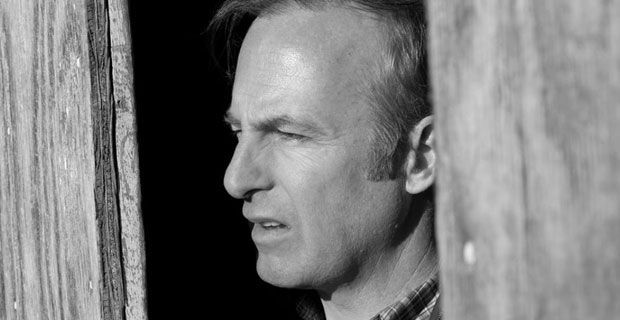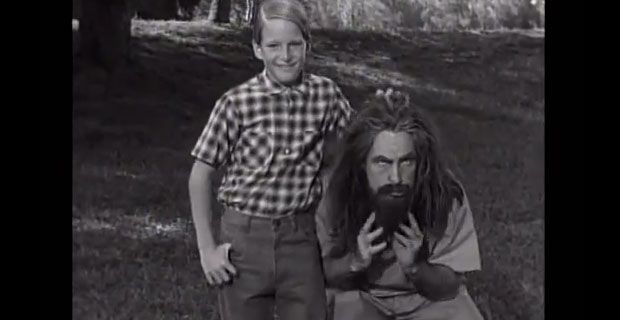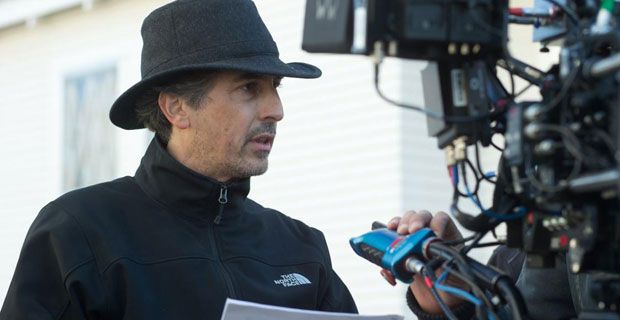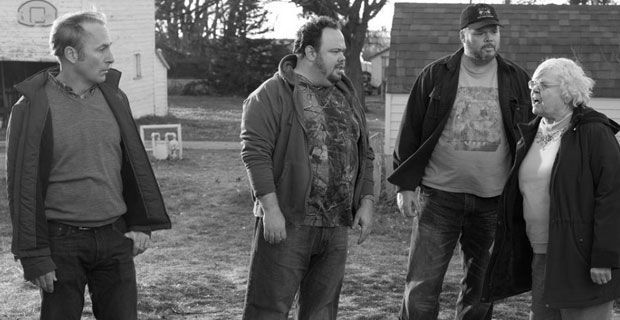When you’re known for such a bold, extreme character like Breaking Bad’s money-hungry criminal lawyer Saul Goodman, it’s quite the show of talent watching Bob Odenkirk shedding that striking persona and losing himself in Nebraska’s far more grounded Ross Grant.
In the film, Bruce Dern (Coming Home) leads as Ross’ father, Woody. As an extremely stubborn aging alcoholic, Woody receives a letter in the mail dubbing him a sweepstakes millionaire and he’s convinced it’s the real deal; nothing will stop Woody from traveling to Nebraska to collect his winnings. In an effort to uphold Woody’s spirit and sanity, Ross’ brother, David (Will Forte, MacGruber), plays along and takes him on the trip, much to Ross and his mother Kate’s (June Squibb, The Big Year) chagrin.
Even though Odenkirk, Dern, Forte and Squibb all make highly unique and unforgettable contributions to the film, one of Nebraska’s prime standout components is the Grant family as a whole, and it’s that very element that helped Odenkirk turn Ross into such a real, layered character.
Check out what Odenkirk told Screen Rant about tapping into his own childhood while playing Ross, working with the esteemed Alexander Payne (The Descendants), what happened to Dern and Squibb’s outrageous onscreen personas when the cameras stopped rolling and more in the interview below.
And if you missed it, click here to catch what Odenkirk had to say about his upcoming Breaking Bad spinoff, Better Call Saul.
Screen Rant: First, totally unrelated to Nebraska, but I was doing a little IMDb prep and it says that you’re also known as Vance Hammersly. Where exactly did that name come from?
Bob Odenkirk: What it is is in doing as many comedy sketches as I’ve done, there are certain names that we come up with, silly names we reuse and I’ve used that name probably four or five times in comedy sketches. And the name is not Vance; it’s Van. Did you ever see the Manson/Lassie piece on Ben Stiller’s show? I use it there and then like three other places in comedy sketches over 30 years. But there’s other names we’ve reused. Not just that. Another great one is Famous Mortimer. That’s someone’s name. [Laughs] That’s a name we used in Mr. Show like four times.
Now for Nebraska, Alexander Payne is known for being a particularly outstanding actor’s director. Were you able to see that in the casting process at all? Was there anything unique about him at that point?
He’s not just taking a wild stab at things. He’s very calm and measured and focused in how he casts it. You don’t show up for a reading with him and find 15 people in the room waiting to read. He works from a short list and he really works with you. Like everything he does, it’s very thought out and planned and focused.
Was there any unease about working with him? I imagine you’re thrilled to be working with this profound filmmaker, but do you ever think, he’s a genius when it comes to working with actors; what if I don’t meet his expectations?
Yeah, sure. I wasn’t overly intimated because he’s a very friendly guy and he gave me the part so I assumed he made the right choice. It’s up to him. They have to give me the part, you know what I mean? I didn’t give it to myself so I assumed he knew what he wanted and I was doing it well. But yeah, you don’t wanna let Alexander down, not with the wonderful work he’s done and with the amazing script and cast that we had. But you also have to approach it like, I believe he believes in me, otherwise I wouldn’t be here. I don’t think you could show up on set going, ‘I hope I don’t suck,’ [laughs] because you’ve got to have a little more faith in yourself than that and in the process.
How was it creating that family dynamic with Bruce, June and Will? Is there anything about you four personally that helped you conjure that natural connection?
My father was an alcoholic and my feelings about him were not unlike the character Ross’ feelings about his father in this movie. I was frustrated by him and angry at him for how he handled our family and yeah, I completely related in a very direct way to the situation and the character.
Having such a personal connection like that, is it tough to balance the drama and comedy of the film?
I just play it honestly. I guess when you ask about balancing the comedy and the drama, I don’t think about it like that. I just play this guy and his drives as honestly as I can and what’s funny is that he’s a Midwesterner in the middle of Nebraska who is surrounded by these incredibly down-to-earth people, but he has some pretentions and ego that you’re not used to seeing and you don’t see anywhere else in this little world that he’s in. He wants to be a celebrity [laughs], and that’s just not reflected anywhere else in the universe that he inhabits so it’s kind of funny. But all I have to do is play those motivations honestly. He’s funny in relation to the people around him and in relation to the environment that he’s in. His pompousness is funny in that.
Woody and Kate are two pretty outrageous characters. What was it like on set when the cameras stopped rolling? Were Bruce and June able to turn them on and off or did life every imitate art, which I imagine could be pretty amusing?
First of all, you have to ask June about life imitating art because she told me the other day that she was known as the filthiest mouth on Broadway when she was on Broadway, which she was on for years as a younger woman. And that’s crazy to imagine because she’s the sweetest lady ever, but I guess she used language pretty freely in her younger years. No, this was not unlike working with Bryan Cranston at Breaking Bad which is to say, when somebody says cut, that character goes away pretty quickly and it’s a bit of a magical experience to watch them very quickly become the character and then drop it off when they need to. So off camera, Bruce is a talkative, chatty, funny, wonderful, sweet guy and then the second we’re rolling, he’s this crotchety, difficult, shutdown person. And June, off camera, is the sweetest, warmest lady ever and then the minute we were rolling the camera, she was a woman filled with anger and frustration.
Even then, Ross and David are two pretty calm, normal people. Did you guys ever discuss how they ended up that way even though they had such outrageous parents?
I gotta tell you; my dad was a difficult guy. I’ve got six brothers and sisters and they’re all good dads and good moms, responsible people, none of them has an alcohol problem and they came from a very difficult place with a lot of trauma and a lot of uncertainty, so I think it happens all the time. I think there’s a lot of responsible people coming out of difficult childhoods and relationships and sometimes they’re overly responsible and that’s just a reaction to growing up in such an uncertain, volatile place.
To wrap up, what was it like for you performing on set where everything is obviously in color and then seeing the final film in black and white? Was anything about the experience strikingly different for you?
Yeah, I think the black and white is incredibly striking and imbues each frame with a lot of feeling that I don’t think real life is maybe as full of emotion as these frames are. This is a beautiful film. I said to somebody, it’s like I walked into a painting. I think I wasn’t aware until I saw the movie that it had so much feeling in it.
_______
Nebraska opens in select theaters on November 15th.
Follow Perri on Twitter @PNemiroff.




